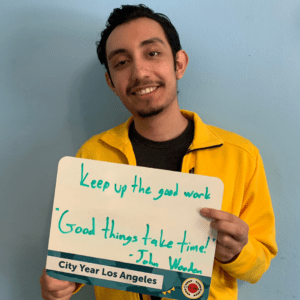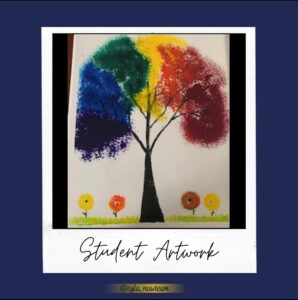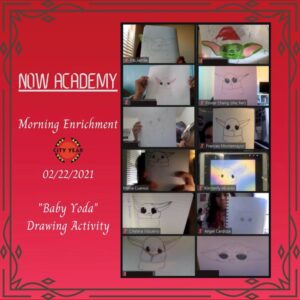The value of social breaktime activities

Given the virtual learning setting resulting from the COVID-19 pandemic, in-class spaces for social activity have become more crucial than ever before. Not only has the pandemic affected scholars’ personal lives with unpredictable financial hardships, emotional stressors, ailing family members and separation from their friends, these decreasing opportunities for socializing increase instances of depression, anxiety and other mental health concerns. As a result, City Year AmeriCorps members, along with their partner teachers, are exploring innovative ways of reintroducing opportunities for socialization within the virtual classroom, to mitigate the consequences of social isolation by nurturing scholars’ social and emotional abilities.
Social activities provide an outlet for scholars to express themselves and build a sense of community. Scholars benefit from both structured and unstructured opportunities to socialize with their peers, as they continue to develop the social skills that will help them build relationships, advocate for themselves, adapt to different situations and navigate the world in a competent, authentic and meaningful way.
 Unstructured breaktime spaces are important because they develop scholars’ sense of agency, giving scholars the chance to either volunteer to lead an activity, participate in an ongoing or pre-planned activity or enjoy their break on their own terms. For example, one day I was unable to create a breaktime activity for our usual breaktime space during class, and one of our scholars, who throughout the course of the year had grown more assertive and participatory within the classroom, asked me if they could lead an unstructured activity in lieu of myself. Not only did our scholar confidently request a leadership role, they also spontaneously led an activity that required them to delegate tasks, call on their peers and keep track of time. As a result, this scholar was able to establish and communicate their needs and goals, gained rapport among their peers and has become more vocal within the classroom.
Unstructured breaktime spaces are important because they develop scholars’ sense of agency, giving scholars the chance to either volunteer to lead an activity, participate in an ongoing or pre-planned activity or enjoy their break on their own terms. For example, one day I was unable to create a breaktime activity for our usual breaktime space during class, and one of our scholars, who throughout the course of the year had grown more assertive and participatory within the classroom, asked me if they could lead an unstructured activity in lieu of myself. Not only did our scholar confidently request a leadership role, they also spontaneously led an activity that required them to delegate tasks, call on their peers and keep track of time. As a result, this scholar was able to establish and communicate their needs and goals, gained rapport among their peers and has become more vocal within the classroom.
This demonstration of participation and authenticity during breaktime translated into having more engaged scholars during class time. When partner teachers and corps members take a step back from directing the virtual space, scholars are given the opportunity to be active participants in their breaktime and shows them that their words and voluntary actions have positive outcomes within their classroom.
Structured spaces, however, prove to help develop a strong sense of belonging within the classroom. Morning enrichment spaces are a great example of this. During this time, activities range from social-emotional development exercises, show-and tell presentations, artwork walkthroughs and Kahoot quizzes on a variety of topics. Within these spaces, the most engaging activities appear to be those that allow scholars to express their talents, as scholars are always thrilled to share their artwork with the group throughout the process of the activity. The creation of recurrent spaces with well-structured activities can go a long way in providing structure to scholars’ lives within an uncertain environment that all too often seems unpredictable and out of their control.
enrichment spaces are a great example of this. During this time, activities range from social-emotional development exercises, show-and tell presentations, artwork walkthroughs and Kahoot quizzes on a variety of topics. Within these spaces, the most engaging activities appear to be those that allow scholars to express their talents, as scholars are always thrilled to share their artwork with the group throughout the process of the activity. The creation of recurrent spaces with well-structured activities can go a long way in providing structure to scholars’ lives within an uncertain environment that all too often seems unpredictable and out of their control.
In closing, a holistic, or “whole-child,” approach implemented within structured and unstructured breaktime activities returns scholars’ feelings of agency and belonging, as it gives them the opportunity to talk to their peers and direct their learning. Having spaces where scholars can interact with their peers, whilst learning to grapple with the risks, challenges, disagreements, disappointments and successes inherent within social interactions, is crucial as it relates to scholars’ individual growth.
Although we cannot predict the long-term effects of virtual learning, we can begin to mitigate the readily apparent challenges by emphasizing a holistic approach to learning that addresses scholars’ social and emotional well-being, alongside their academic performance, to ensure that they are engaged deeply enough to learn in the long term.
Related stories
At City Year Los Angeles (CYLA), we are deeply committed to helping Los Angeles students achieve their goals, and we...
Read more about Empowering Futures: How an Exclusive Madison Wells Internship Is Transforming City Year LA AmeriCorps Members’ CareersDear Champions of City Year Los Angeles, Across Los Angeles schools, a sense of excitement, anticipation, and yes, perhaps some...
Read more about Back To School Message From City Year LA Executive Director, Dr. Sandra CanoAt City Year, service is at the heart of everything we do. But our commitment to our corps members doesn’t...
Read more about Empowering Futures: City Year’s Commitment to Career DevelopmentOur team at Ascot Elementary School had the pleasure of hosting the U.S. Deputy Secretary of Education Cindy Marten to...
Read more about U.S. DSEd Cindy Marten Visits Ascot ES to Spotlight Impact of Student Success Coaches















